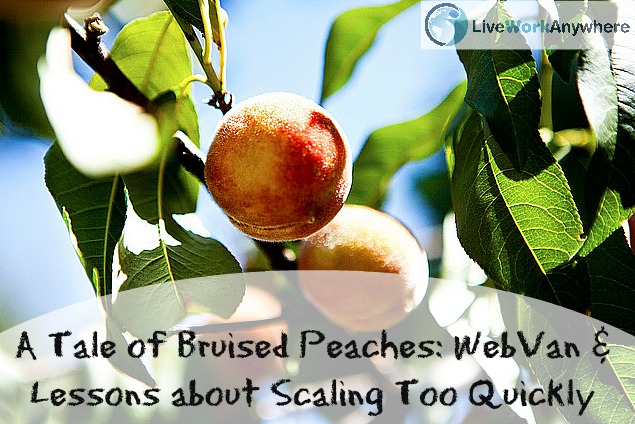I recently got to meet Coppy Holzman, former CEO of Webvan.com, one of the most famous dot com bust stories. It was an incredible experience, and I wanted to share the great advice I received from him.
Here’s the backstory you need to know: Webvan raised over $1 billion dollars in an attempt to do what FedEx did for shipping to the grocery business. They wanted to be THE grocery delivery service for people savvy onlne.
At one point the company was worth $9 billion, only to be worth a whopping ZERO billion within a short time. “A short time,” in this case, meant only a year or two.
I asked Coppy what was the biggest lesson he learned about the business’s failure, and if there was any difference in terms of how he managed his companies’ growth now.
Coppy told me a story about bruised peaches. The analogy is one I’ll never forget.
In the beginning, Webvan investors were pouring in money and barking plans for expansion. Webvan was turning down investment. They were told to scale to 26 cities as quickly as they could. They needed to block out any competition.
A store would call in Seattle saying that their peaches had arrived, but they were bruised. But Webvan didn’t have time to fix the problem because they were too busy expanding into Boston and into other cities. This attitude would eventually lead to their downfall.
Lessons from Webvan:
1. Never forget your customers. They don’t want bruised peaches.
2. Don’t scale too quickly. Focus on slow, local growth and high customer service.
3. Don’t take investment until you’ve created a system. The right time to take investment is when you have laid the groundwork and created a system for sustainable growth. With no system in place and hockey stick growth, you have nowhere to go but down.
4. Some industries don’t match up and scale in the same way as others. Shipping peaches and shipping CDs are different products with different variants. Know what you’re getting into and what the barriers are beforehand.
We experienced scaling too quickly with my other business, Beer2Buds. We had no system in place to handle all of the support and accounts. We scaled and scaled, only to learn that without proper a customer management system in place nothing else mattered.
So now, I focus on slower, systematic, calculated growth. Test, measure, repeat. And always treat your customers well. Because that’s the whole point!
Have you ever heard of a company burning out like WebVan did? Did you keep using them?
